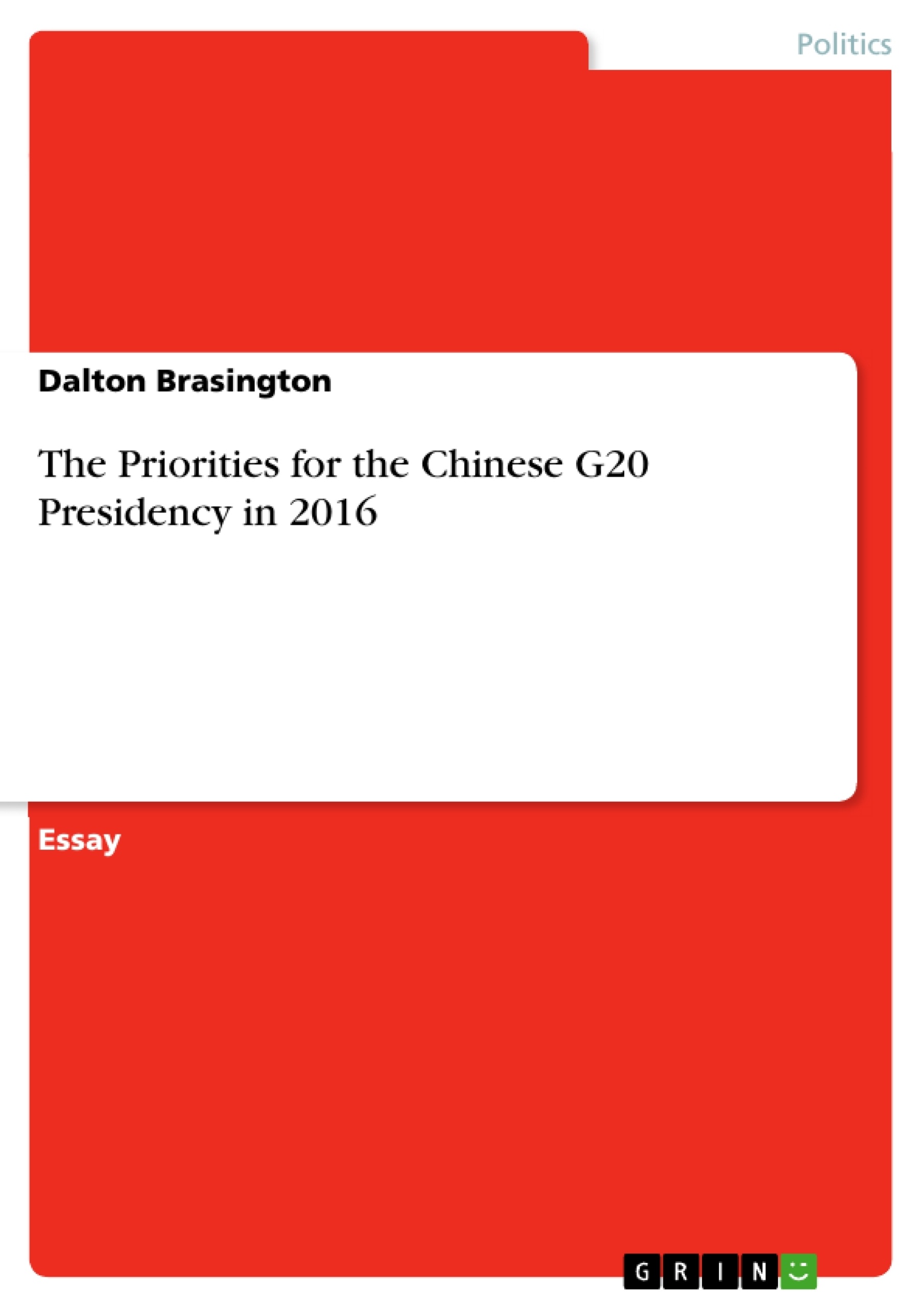Excerpt
Message from Chinese President Xi Jinping
Even though it has been seven years since the world experienced The Great Recession of 2008-2009, the global market is still recovering. The G20 is the premier force of the global market. As such, we represent the most powerful nations in the world, and now we must continue to work together to unite the globe and inspire every country to work hard and prosper.
The G20 must understand that while we do represent the great economies of the world, our job does not end at the shores of our nations. Our job does not end with the connections we make here at the summit in Hangzhou. We must extend our reach to every corner of the globe, even the areas that are not represented here.
This philosophy is evident in the G20 committees decision in China hosting the summit. With the start of presidencies as rotating regional groups, and Asian countries being among the first, shows the prominence of China (Chin). In the wake of the 2008-2009 financial crisis, China still continued its rise in global power. It is because of this that we sit here today in Hangzhou. Not only does it show the prominence of China and our past actions, but hope from the G20 for Asian leadership to expand throughout the global policy agreements and financial markets.
Lessons Learned from Turkey
We would obviously be remiss if we did not mentioned the valuable lessons we learned from Turkey in 2015. The Prime Minister did a fantastic job in hosting the summit, and the things we took away will continue into the spirit of this summit. We wish to continue the philosophy of the three I’s from the Turkish Presidency.
These lessons are evident in the priorities of the Chinese Presidency of 2016. We must work together to create opportunities for nations that do not sit at this table to make active strides towards becoming global powerhouses. On top of the work of last year’s summit, we must continue to create the chance for building on investments around the world. While none of these tasks are easy, we must do them as the leaders of the global market. It is important for each of our nations to serve as examples for our countries and assist them in achieving their goals.
I look forward to working with each of you.
illustration not visible in this excerpt
Xi Jinping
President of China
Priorities for 2016
Under the Chinese Presidency in 2016, the emphasis will be to continue the work of past G20 summits, while looking towards the future of the globe. The following are key assets to China’s role as the leader of the G20 aid in the ability of the globe to create economic growth for as many people as possible.
The components of the 2016 agenda will be as follows:
1. Defending and Creating the 2% (Triggs)
2. Global Energy (Turkey & G20)
3. Asia and the World (Chin)
Defending and Creating the 2%
The G20 is actively involved with expanding the GDP of the G20 members by 2% by the year 2018. While this seems like an ambitious challenge, it can be completed by several reforms and adjustments within the G20. We understand that implementation of goals that work towards this 2% increase have been met with roadblocks, whether it is immigration policy and reform in the US or public investments versus private investments in Germany (Triggs). The G20 must reorganize in order to meet the deadline set in Australia.
Infrastructure
The big idea of investments from Turkey carries through to this year, but with a different mindset. While Turkey just drove the scheme of investments overall, to achieve our 2% in the next two years, we must have a focused outlook. We must look away from sole public investments in the infrastructure. The private sector is the place where potential investment opportunities could appear (Triggs). By leveraging these private options, rather than the public alternative, countries should find success in this kind of implementation. The private sector has a vested interest in supporting infrastructure in any nation. In China, by contacting private corporations for public goods - not only are companies included in the process, but citizens are the benefactors of this help.
Employment
The issue with our current employment options is that the G20 is looking at more of a small-scale scheme. In order to get the world’s workforce to a sustainable order where the GDP can grow, the workforce in all needs to be better motivated to succeed (Triggs). This means that emphasis needs to be put on groups who are usually left out of the process. For many countries around the world, this means that women need to be motivated just as much as their male counterparts (Triggs). By working with the entire working class, rather than in small subsections, results will be more widely seen. This is a cultural issue as much as an economic value. By motivation women from an early age to be just as good, if not better, than their peers - they will get the urge to succeed from a young time. This will mean that more women are included in government and the workforce. It will also mean that companies will begin to represent their respective nations, much like Canada’s Prime Minister Justin Trudeau did in creating a diverse cabinet.
[...]
- Quote paper
- Dalton Brasington (Author), 2015, The Priorities for the Chinese G20 Presidency in 2016, Munich, GRIN Verlag, https://www.grin.com/document/312222
Publish now - it's free






















Comments